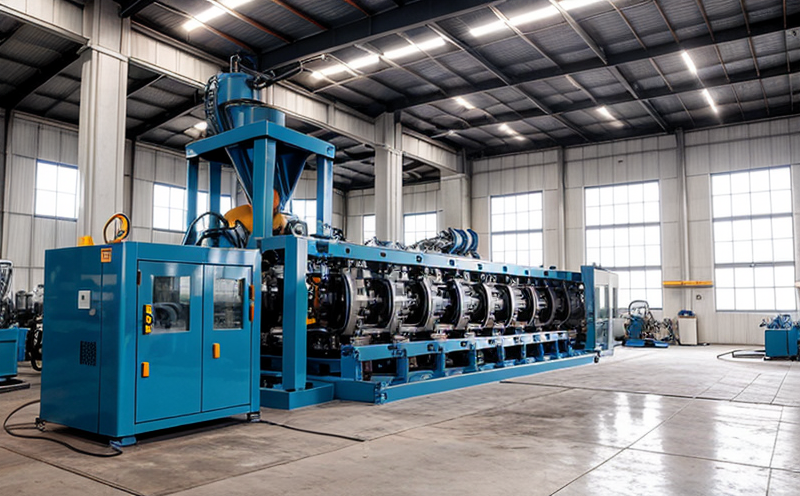ASTM D790 Flexural Testing of Equipment Components
The ASTM D790 standard specifies the procedure for determining the flexural properties of plastic materials. In industrial manufacturing and processing, this test is particularly critical when evaluating the performance and durability of equipment components such as gears, bearings, and structural parts made from thermoplastics or other flexible plastics.
Flexural testing measures a material's ability to withstand bending stress without breaking. This test method is essential for ensuring that machinery and equipment components can endure the mechanical stresses they encounter during operation without failure. The ASTM D790 procedure involves applying progressively increasing load until the specimen fractures, from which various properties such as flexural strength, modulus of elasticity, and flexural strain can be calculated.
For industrial manufacturers and processing plants, this test is crucial for several reasons. Firstly, it provides critical insights into material behavior under bending loads, allowing engineers to optimize designs for both performance and cost-effectiveness. Secondly, ASTM D790 testing ensures compliance with industry standards and regulations, which are essential for maintaining a competitive edge in the global market. Lastly, by identifying potential weaknesses early in the product lifecycle, manufacturers can improve reliability and extend the operational life of their equipment.
The ASTM D790 test involves several key steps to ensure accurate results. Specimens are cut from the component or fabricated specifically to fit the testing machine's requirements. The specimens must be free from defects that could affect the test outcome. Loading is applied gradually, and care is taken to avoid any external factors that might influence the results.
Once the test is complete, comprehensive reports are generated detailing the flexural strength, modulus of elasticity, and other relevant properties. These data points are crucial for quality assurance teams, R&D engineers, and compliance officers in making informed decisions about material selection and process optimization.
- Industry Applications: Automotive, aerospace, construction equipment, consumer electronics
- Why Choose This Test: Ensures material durability, supports regulatory compliance, enhances product reliability
Why It Matters
The ASTM D790 flexural testing is not just a routine procedure; it's a cornerstone of quality assurance in industrial manufacturing and processing. By adhering to this standard, manufacturers can ensure that their components meet the highest levels of durability and reliability. This is particularly important for machinery and equipment where failure could lead to significant downtime, safety hazards, or even catastrophic failures.
Flexural strength is a critical property for any component subjected to bending stress during operation. By testing these properties early in the design process, engineers can identify potential weaknesses before they become costly issues. This proactive approach not only saves time and resources but also ensures that products meet customer expectations and regulatory requirements.
The ASTM D790 test is particularly relevant for materials commonly used in industrial manufacturing such as polyethylene (PE), polypropylene (PP), polystyrene (PS), and other thermoplastics. These materials are often chosen for their flexibility, lightweight properties, and cost-effectiveness. However, their ability to withstand mechanical stress must be carefully evaluated to ensure they perform reliably under real-world conditions.
Compliance with ASTM D790 is also essential for meeting international standards and regulations. Many industries have specific requirements for material performance that are outlined in these standards. By adhering to such standards, manufacturers can demonstrate their commitment to quality and reliability, which enhances trust among customers and regulatory bodies alike.
Industry Applications
- Automotive: Testing of gears, bearings, and structural components in engine assemblies
- Aerospace: Evaluating the flexural properties of composite materials used in aircraft structures
- Construction Equipment: Assessing the durability of hydraulic hoses and other flexible components
- Consumer Electronics: Ensuring the reliability of connectors, casings, and other plastic parts
- Medical Devices: Verifying the strength of plastic components used in medical equipment
- Furniture Manufacturing: Testing the flexibility and durability of materials used in furniture construction
- Petrochemical Industry: Evaluating the performance of pipes and valves subjected to bending stress
- Plastics Recycling: Assessing the reusability and recyclability properties of plastic waste streams
Why Choose This Test
- Ensures Material Durability: ASTM D790 testing helps identify materials that can withstand bending stress without breaking.
- Supports Regulatory Compliance: Adhering to this standard ensures that products meet international and local regulations.
- Enhances Product Reliability: By identifying potential weaknesses early, manufacturers can improve the reliability of their products.
- Saves Time and Resources: Early testing allows for design optimization before full-scale production begins.
- Demonstrates Quality Assurance: Compliance with ASTM D790 is a testament to a manufacturer's commitment to quality and reliability.
- Promotes Competitive Advantage: Meeting industry standards can enhance a company's reputation and market position.





